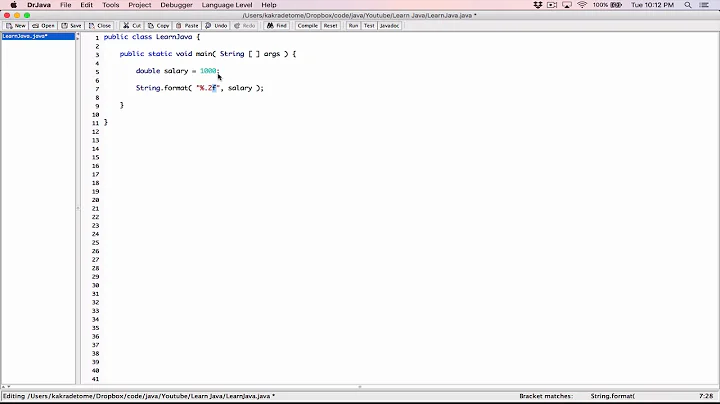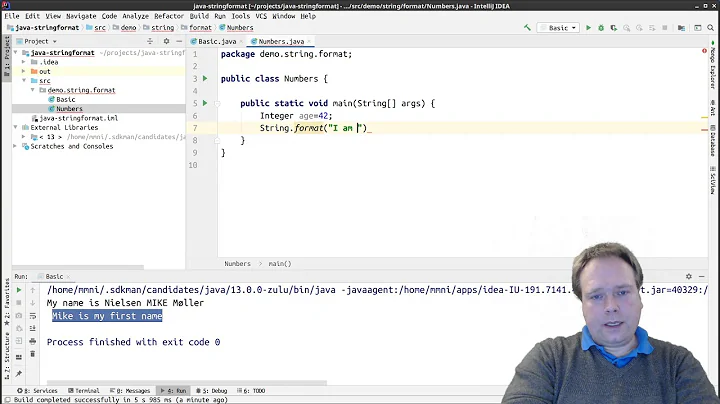StringFormat on Binding
Solution 1
The best and the easiest way would be to use a converter to which you pass the Date and get the formatted string back. In e.g. MyNamespace.Converters namespace:
public class DateFormatConverter : IValueConverter
{
public object Convert(object value, Type targetType, object parameter, string language)
{
if (value == null)
return null;
DateTime dt = DateTime.Parse(value.ToString());
return dt.ToString("dd/MM/yyyy");
}
public object ConvertBack(object value, Type targetType, object parameter, CultureInfo culture)
{
throw new NotSupportedException();
}
}
And in your xaml just reference the converter and add the following converter:
xmlns:conv="using:MyNamespace.Converters"
in your xaml page and in page.resources add this
<conv:DateFormatConverter x:Name="DateToStringFormatConverter"/>
<TextBlock Text="{Binding Date, Converter={StaticResource DateToStringFormatConverter}"/>
Solution 2
There is no property named StringFormat in Binding class. You can use Converter and ConverterParameter to do this. You can refer to Formatting or converting data values for display.
For example here, I bind the date of a DatePicker to the text of a TextBlock.
XAML:
<Grid Background="{ThemeResource ApplicationPageBackgroundThemeBrush}">
<Grid.Resources>
<local:DateFormatter x:Key="DateConverter"/>
</Grid.Resources>
<DatePicker Name="ConverterParmeterCalendarViewDayItem"></DatePicker>
<TextBlock Height="100" VerticalAlignment="Top" Text="{Binding ElementName=ConverterParmeterCalendarViewDayItem, Path=Date, Converter={StaticResource DateConverter},ConverterParameter=\{0:dd/MM/yyyy\}}" />
</Grid>
code behind, the DateFormatter class:
public class DateFormatter : IValueConverter
{
public object Convert(object value, Type targetType, object parameter, string language)
{
var a = language;
// Retrieve the format string and use it to format the value.
string formatString = parameter as string;
if (!string.IsNullOrEmpty(formatString))
{
return string.Format(formatString, value);
}
return value.ToString();
}
// No need to implement converting back on a one-way binding
public object ConvertBack(object value, Type targetType, object parameter, string language)
{
return DependencyProperty.UnsetValue;
}
}
Solution 3
I know this is late but I had the same question and came up with this solution. Maybe not the shortest but pure XAML.
<TextBlock>
<Run Text="{x:Bind Foo.StartDate.Day}"/>.<Run Text="{x:Bind Foo.StartDate.Month}"/>.<Run Text="{x:Bind Foo.StartDate.Year}"/>
</TextBlock>
Solution 4
Since 14393, you can use functions in x:Bind.
This means you can format your date like:
Text="{x:Bind sys:String.Format('{0:dd/MM/yyyy}', ViewModel.Date)}"
Just ensure you have included a reference to the System namespace:
<Page
xmlns:sys="using:System"
...
Solution 5
why to complicate? You can use compiled data binding
{x:Bind ViewModel.PropertyWithDateTime.ToString("....")}
Related videos on Youtube
Comments
-
 developer033 almost 4 years
developer033 almost 4 yearsView:
<TextBlock Text="{Binding Date}"/>I want to format the Date to "dd/MM/yyyy", in other words, without the time.
I tried it:
<TextBlock Text="{Binding Date, StringFormat={}{0:dd/MM/yyyy}}"/>, but it doesn't work.Gives me an error: The property 'StringFormat' was not found in type 'Binding'.
-
 James Croft over 8 yearsCame to give exactly the same answer. The best way it can be done is with a converter, as shown above, unless you change the Date to a string in code-behind and format it there instead. Info on DateTime formats
James Croft over 8 yearsCame to give exactly the same answer. The best way it can be done is with a converter, as shown above, unless you change the Date to a string in code-behind and format it there instead. Info on DateTime formats -
 developer033 over 8 yearsIt doesn't work. Error: The resource "DateStringToFormatConverter" could not be resolved.
developer033 over 8 yearsIt doesn't work. Error: The resource "DateStringToFormatConverter" could not be resolved. -
 developer033 over 8 yearsUnfortunately, it isn't working here..The type 'local:DateFormatter' was not found. What am I missing?
developer033 over 8 yearsUnfortunately, it isn't working here..The type 'local:DateFormatter' was not found. What am I missing? -
CodeNoob over 8 yearsYou have to declare the converter in your xaml to use it
-
 developer033 over 8 yearsIf you could edit your answer to a complete answer, would be great.
developer033 over 8 yearsIf you could edit your answer to a complete answer, would be great. -
 Grace Feng over 8 yearsYou need to create a class named DateFormatter, please see my
Grace Feng over 8 yearsYou need to create a class named DateFormatter, please see myDateFormatterclass. -
 Grace Feng over 8 years@developer033 Ok, please see my shared sample StringFormatInBinding.
Grace Feng over 8 years@developer033 Ok, please see my shared sample StringFormatInBinding. -
 developer033 over 8 years@GraceFeng-MSFT I downloaded your project and put everything equal to its... Same error: "The type 'local:DateFormatter' was not found. Verify that you are not missing an assembly reference and that all referenced assemblies have been built.".
developer033 over 8 years@GraceFeng-MSFT I downloaded your project and put everything equal to its... Same error: "The type 'local:DateFormatter' was not found. Verify that you are not missing an assembly reference and that all referenced assemblies have been built.". -
 Grace Feng over 8 years....Did you delete this
Grace Feng over 8 years....Did you delete thisxmlns:local="using:'your project'"? If not, there is some problem with the xaml designer, it may be tagged as a error, but you can still run this project and it should work fine. -
dex3703 over 7 years@GraceFeng-MSFT - Your OneDrive link doesn't work any more. Could you update it?
-
 Billy Jake O'Connor over 7 yearsUse the parameter to pass the format string and this does the job. I wonder why they didn't implement StringFormat in UWP?
Billy Jake O'Connor over 7 yearsUse the parameter to pass the format string and this does the job. I wonder why they didn't implement StringFormat in UWP? -
stevokk almost 7 yearsIf XAML complains about not finding reference to your DateFormatter, make sure the xmls:local variable points to the right namespace. You can always make a new xmls reference called whatever you like to point to a specific file.
-
Nigel Ren over 6 yearsWhilst code only answers may solve the original problem, some explanation would help a lot in understanding the method you've used and how it works.
-
 Shahriar over 5 yearsthis is not a UWP solution
Shahriar over 5 yearsthis is not a UWP solution -
 The Pademelon about 5 years
The Pademelon about 5 yearsStringFormatdoes not exist in UWP'sBindingclass. Furthermore, XML is not the same as XAML. XAML is an XML-based technology, but XAML and XML are not interchangeable terms. -
 BurnsBA almost 3 yearsThis is for the
BurnsBA almost 3 yearsThis is for theWindows.UI.Xaml.Datanamespace. For theIValueConverterinSystem.Windows.Datathe method signature on Convert and ConvertBack changes thestring languageparameter toCultureInfo culture.










